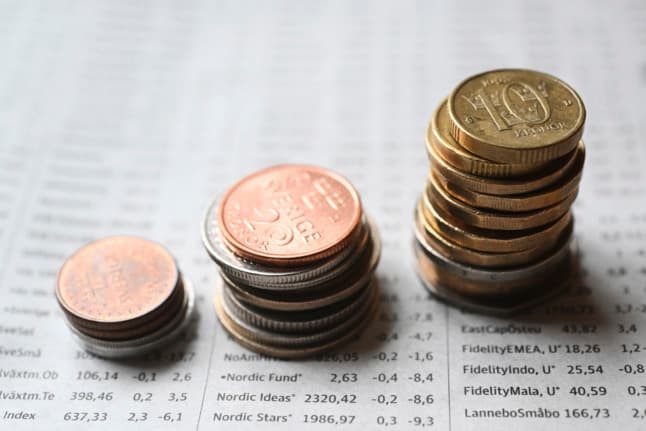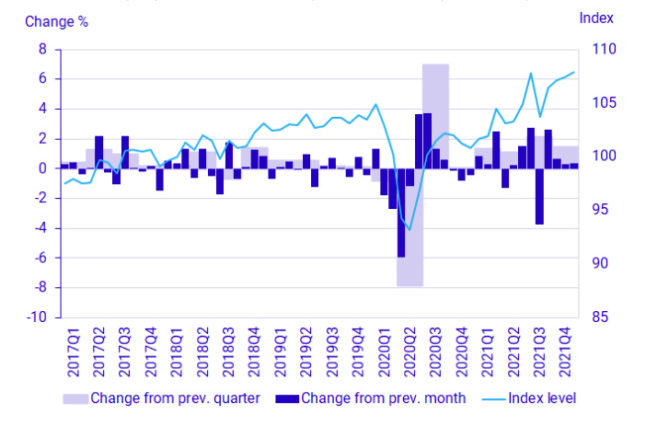Swedish GDP rose 7 percent year-on-year in December

The Swedish economy is stronger than expected, with negative effects due to Covid-19 restrictions appearing to have less of an impact than previously feared.
Swedish GDP increased by 7 percent year-on-year in December, and 6.2 percent year-on-year in the fourth quarter, according to figures from Statistics Sweden.
This is stronger than expected, surpassing bank SEB's 5.5 percent prognosis for last quarter.
“The year ended with continued growth in December following a quarter with steady development throughout the period” said Melker Loberg, economist at Statistics Sweden.
Swedish GDP was higher in the fourth quarter of last year than predicted before the pandemic began. "In other words, you could argue that the economy is stronger than it would have been if the pandemic had not occurred," Torbjörn Isaksson, head analyst at Nordea bank, commented to newswire TT.
According to preliminary figures, GDP rose in 2021 with 5.2 percent compared with 2020. Statistics have been corrected for seasonal effects and calendar effects – December and the last quarter of 2021 both had one extra working day than the same period the previous year.
GDP, seasonally adjusted volume development and index (2020 = 100) (Statistics Sweden)
In addition to this, unemployment is clearly declining, according to Statistics Sweden's measurements.
This strong growth is chiefly due to Omicron having less of an effect on the economy than expected, Alexandra Stråberg, head economist at bank Länsförsäkringar, told TT. This despite the fact that a record-high infection rate is putting significant pressure on the welfare system.
"It's clear that restrictions have not had the same effect on the economy this time as in previous waves of the coronavirus. We can see that in GDP, but also in a somewhat lower rate of unemployment," she said.
The Swedish government has recently indicated that restrictions could be removed on February 9th, which Stråberg also believes could further help the economy. However, she does not believe that the increase in GDP will improve recent instability seen on the stock market.
"This is good in a general sense, but this isn't what's affecting the stock market. The instability on the stock market is caused by Covid, geopolitics, the security situation, inflation and increased interest rates from the American central bank," Stråberg told TT.
In Sweden, inflation is currently increasing due to high fuel and energy prices. However, there is no high pressure on salaries, as unemployment is still relatively high. Therefore, the majority of experts believe that inflation will sink in line with milder weather.
"In order to have wider upwards pressure on inflation, you need a much stronger labour market, and we're not there yet. That's the difference between Sweden and the USA. They have a wider increase in inflation which they need to deal with," Stråberg told the newswire.
Comments
See Also
Swedish GDP increased by 7 percent year-on-year in December, and 6.2 percent year-on-year in the fourth quarter, according to figures from Statistics Sweden.
This is stronger than expected, surpassing bank SEB's 5.5 percent prognosis for last quarter.
“The year ended with continued growth in December following a quarter with steady development throughout the period” said Melker Loberg, economist at Statistics Sweden.
Swedish GDP was higher in the fourth quarter of last year than predicted before the pandemic began. "In other words, you could argue that the economy is stronger than it would have been if the pandemic had not occurred," Torbjörn Isaksson, head analyst at Nordea bank, commented to newswire TT.
According to preliminary figures, GDP rose in 2021 with 5.2 percent compared with 2020. Statistics have been corrected for seasonal effects and calendar effects – December and the last quarter of 2021 both had one extra working day than the same period the previous year.
In addition to this, unemployment is clearly declining, according to Statistics Sweden's measurements.
This strong growth is chiefly due to Omicron having less of an effect on the economy than expected, Alexandra Stråberg, head economist at bank Länsförsäkringar, told TT. This despite the fact that a record-high infection rate is putting significant pressure on the welfare system.
"It's clear that restrictions have not had the same effect on the economy this time as in previous waves of the coronavirus. We can see that in GDP, but also in a somewhat lower rate of unemployment," she said.
The Swedish government has recently indicated that restrictions could be removed on February 9th, which Stråberg also believes could further help the economy. However, she does not believe that the increase in GDP will improve recent instability seen on the stock market.
"This is good in a general sense, but this isn't what's affecting the stock market. The instability on the stock market is caused by Covid, geopolitics, the security situation, inflation and increased interest rates from the American central bank," Stråberg told TT.
In Sweden, inflation is currently increasing due to high fuel and energy prices. However, there is no high pressure on salaries, as unemployment is still relatively high. Therefore, the majority of experts believe that inflation will sink in line with milder weather.
"In order to have wider upwards pressure on inflation, you need a much stronger labour market, and we're not there yet. That's the difference between Sweden and the USA. They have a wider increase in inflation which they need to deal with," Stråberg told the newswire.

Join the conversation in our comments section below. Share your own views and experience and if you have a question or suggestion for our journalists then email us at [email protected].
Please keep comments civil, constructive and on topic – and make sure to read our terms of use before getting involved.
Please log in here to leave a comment.